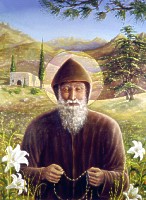Arkansas Catholic has two good articles up. The first one that I will mention deals with the Sacrament of Reconciliation. It's a good read in preparing for Lent.
Reconciliation is personal encounter with Christ
The second article offers a short reflection on Bishop Edward Fitzgerald, second Bishop of Little Rock. February 21 marks the 100th anniversary of his death. Until reading this article I did not know that Bishop Fitzgerald was one of only two bishops to vote against the dogma of papal infallibility during the first Vatican Council. The article offers some explanation for the reasoning behind his vote.
Bishop Edward Fitzgerald was a reluctant but ready servant
Saturday, February 17, 2007
Subscribe to:
Post Comments (Atom)






4 comments:
As to the second article:
That council is interesting for what it did and didn't do.
On the matter of papal infallibility, many prominent and influential men were opposed.
The Wiki article mentions 60 bishops who left Rome before the vote.
All the more, then, the action of the Holy Spirit is evident in the vote's outcome.
What the council didn't accomplish is also, I think, a sign of the Holy Spirit's activity: a solemn pronouncement on the nature of Christ's atonement in specific and technical language.
But, according to Wiki, "the outbreak of the Franco-Prussian War interrupted the council. It was suspended following the capture of Rome and never resumed."
Do you agree with Bishop Fitzgerald that Arkansas is a "suburb of hell?"
When my husband had a temporary job assignment in Little Rock, Christians tried to convert him. He thought claiming to be Catholic would fend them off, but it only inspired them to engage him all the more.
Well I wrote a response to this and lost it....I'll try again.
I think Arkansas is a misunderstood state. It carries with it the perception of being backwards and unimportant. A reputation that isn't completely undiserved.
However, today Arkansas is a much different state than in the past. It is home to a few of the country's and world's largest companies. i.e. Wal-Mart, Tyson Foods, Alltel.
It is also one of the most geographically diverse states. Cultural diversity is on the rise.
However, in Bishop Fitzgerald's day he was dealing with a much different area. He was in charge of a diocese that included all of Arkansas and present day Oklahoma. He had four priests in his charge. Catholicism was not very popular in the area at that time.
Today, I would have to say that the Catholic Church in Arkansas is definately growing. However, in many parts of the state it is still unknown. For example, I grew up in a town of less than 2000 people in southwest Arkansas. I was a senior in high school before I knew that there was a Catholic church in town. In fact, there are only two Catholic churches in the entire county and they are both missions of St. Edwards parish in Texarkana, Arkansas.
I can see why Bishop Fitzgerald may have described Arkansas as a "suburb of hell" during his time as Bishop of Little Rock. However, he did a lot to change that and cultivate the growth of the Church in Arkansas. Today, I would not use that description of the state.
Today, I would not use that description of the state.
No, I should think not.
And what a shame that the Bishop felt that way about the area he was called to serve.
That was my point. Regardless of whether the sentiment was justified.
I wonder what would happen if a bishop made a similar statement about his diocese today?
I would suspect that Bishop Fitzgerald's comment wasn't made public until many years later. Today, it would probably come to light much sooner. There would be plenty of Catholic bloggers talking about it. I'm sure it would create a small scandal.
Yes, it is sad that the condition of the diocese would have prompted him to make this statement. However, we can rejoice in the work that he did to help the diocese become the much different place that it is today.
Post a Comment